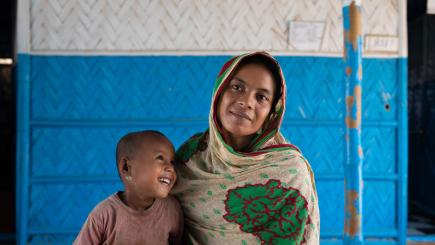The Global Compact on Refugees promotes responsibility sharing with host countries by focusing on solutions, both in terms of expanding opportunities for resettlement as well as other solutions in third countries such as complementary pathways. Explore how UNHCR and partners work together to turn this element of the Compact into action.
Third-Country Solutions
Refugee situations continue to increase in scope, scale and complexity. The vast majority of refugees (85 per cent) are hosted in low and middle-income countries. Despite the generosity of host countries and donors, there is an urgent need to share the responsibility for hosting and supporting the world’s growing number of refugees more equitably.
Resettlement is the transfer of refugees from the country where they have sought protection to another country that has agreed to admit them, as refugees, with permanent residence status. Resettlement is an invaluable protection tool to meet specific needs of refugees in which life, liberty, safety, health or fundamental human rights are at heightened risk. Emergency or urgent resettlement may be necessary to ensure the security of refugees who are threatened with refoulement to the country of origin, or those whose physical safety is seriously threatened in the country in which they have sought refuge. Typically, less than 1% of the 20.4 million refugees under UNHCR’s mandate worldwide are resettled.
Find more information on resettlement at unhcr.org/resettlement.
Complementary pathways for admission are safe and regulated avenues for refugees that complement resettlement by providing lawful stay in a third country where their international protection needs are met. They are additional to resettlement and do not substitute the protection afforded to refugees under the international protection regime. Complementary pathways are diverse by nature and can benefit refugees in a variety of ways depending on their specific objectives. For example, some complementary pathways for admission, such as humanitarian admission, private or community sponsorship programmes or humanitarian visas, may be intended for persons in need of international protection.
For more information on complementary pathways on unhcr.org/complementary-pathways.
The Three-Year Strategy
The GCR envisaged the development of a Three-Year Strategy (2019-2021) on Resettlement and Complementary Pathways (hereinafter, the Strategy), as a key vehicle to increase the number of resettlement spaces, expand the number of resettlement countries and improve the availability and predictability of complementary pathways for refugees. The Strategy’s goals are to:
- Grow Resettlement: New Resettlement Countries and More Places
- Advance Complementary Pathways: Improve Access and Develop Opportunities
- Build the Foundation: Promote Welcoming and Inclusive Societies
This multi-stakeholder Strategy is the result of wide-ranging consultations with a large number of relevant stakeholders across different regions, including, States, national and international non-governmental organizations (NGOs), civil society, private sector actors, academia, faith-based actors, refugees and other UN agencies.
The Strategy is both a roadmap for expansion over the next three years (2019-2021), and an ambitious blueprint for the further development of third country solutions over the next 10 years (2019-2028) through a vision that will continue to be relevant to achieving the goals of the GCR in the longer term.

The Sustainable Resettlement and Complementary Pathways Initiative (CRISP)
The CRISP is a UNHCR-IOM led, multi-stakeholder initiative and the crucial tool for the implementation of the actions identified under the Strategy. It is directly aligned to the Strategy, intended to provide a tangible way for States to support the expansion of third country solutions to make concrete contributions and pledges towards the objectives of the GCR. The CRISP is envisioned as a driver for implementing the Strategy and achieving its goals. It aims to support States and key stakeholders to establish, expand or renew resettlement programmes and advance complementary pathways for admission of refugees through specific and focused capacity building activities, directed in a strategic and coordinated manner, in partnership with relevant actors at the local, national, regional and global levels.
CRISP Activities

resettle.org
resettle.org
Visit the portal of the Sustainable Resettlement and Complementary Pathways Initiative (CRISP)
Visit the portal of the Sustainable Resettlement and Complementary Pathways Initiative (CRISP)



